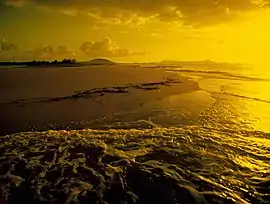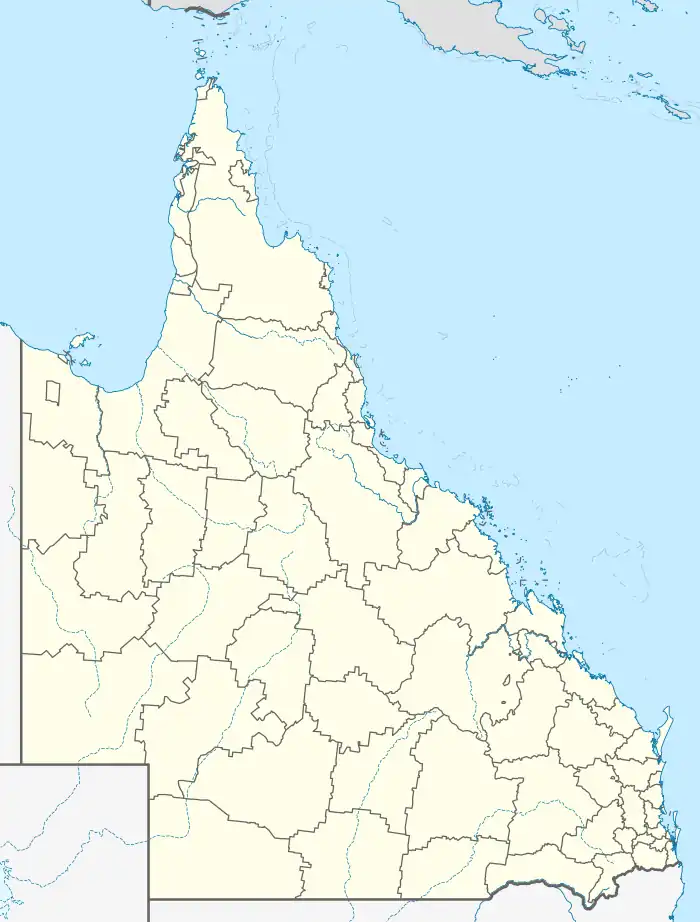Tully Heads, Queensland
Tully Heads is a coastal town and locality in the Cassowary Coast Region, Queensland, Australia.[2][3] In the 2016 census, the locality of Tully Heads had a population of 354 people.[1]
| Tully Heads Queensland | |||||||||||||||
|---|---|---|---|---|---|---|---|---|---|---|---|---|---|---|---|
 Sunset over the beach at Tully Heads, 1984 | |||||||||||||||
 Tully Heads | |||||||||||||||
| Coordinates | 18.0191°S 146.0566°E | ||||||||||||||
| Population | 354 (2016 census)[1] | ||||||||||||||
| • Density | 31.89/km2 (82.6/sq mi) | ||||||||||||||
| Postcode(s) | 4854 | ||||||||||||||
| Area | 11.1 km2 (4.3 sq mi) | ||||||||||||||
| Time zone | AEST (UTC+10:00) | ||||||||||||||
| Location |
| ||||||||||||||
| LGA(s) | Cassowary Coast Region | ||||||||||||||
| State electorate(s) | Hinchinbrook | ||||||||||||||
| Federal division(s) | Kennedy | ||||||||||||||
| |||||||||||||||
Geography

The Coral Sea forms the eastern boundary, and the Tully River the southern.[4]
The beach Googarra Beach (18.0104°S 146.0619°E) extends along the locality's coast line extending into Hull Heads to the north.[5]
Immediately offshore is Rockingham Bay (18.02°S 146.070°E).[6] It was named on 8 June 1770 by Lieutenant James Cook on his 1770 voyage on the HM Bark Endeavour, after Charles Watson-Wentworth, the Second Marquis of Rockingham and former British Prime Minister.[7]
History

The town and locality of Tully are named after the Tully River, which in turn was named after surveyor-general William Alcock Tully.[2]
in 1963 to 1964, sailor William Willis, at the age of 71, sailed 10,000 miles from South America to Australia single-handing a 34-foot (10.4 m) raft named Age Unlimited. He left Callao in Peru on 5 July 1963, made a lengthy stop in Apia in Samoa, and after a total of 204 days at sea, arrived near Tully Heads, completing his voyage on 9 September 1964. He was severely injured on his arrival, being paralysed from the waist down, and was rescued by teacher Hendrik Jan Penning, a resident of Tully Heads.[8][9]
On 3 February 2011, Tully Heads suffered extensive damage when Cyclone Yasi made landfall, causing a storm surge.[10]
In the 2016 census, the locality of Tully Heads had a population of 354 people.[1]
Education
There are no school in Tully Heads. The nearest government primary school is Lower Tully State School in neighbouring Lower Tully to the west. The nearest government secondary school is Tully State High School in Tully to the north-west.[11]
Amenities
There is a boat ramp in Galmahra Street into Mosquito Creek, a tributary of the Tully River (18.0186°S 146.0518°E). It is managed by the Cassowary Coast Regional Council.[12]
References
- Australian Bureau of Statistics (27 June 2017). "Tully Heads (SSC)". 2016 Census QuickStats. Retrieved 20 October 2018.
- "Tully Heads – town in Cassowary Coast Region (entry 35302)". Queensland Place Names. Queensland Government. Retrieved 6 March 2022.
- "Tully Heads – locality in Cassowary Coast Region (entry 45773)". Queensland Place Names. Queensland Government. Retrieved 6 March 2022.
- Google (29 August 2021). "Tully Heads, Queensland" (Map). Google Maps. Google. Retrieved 29 August 2021.
- "Mountain ranges beaches and sea passages - Queensland". Queensland Open Data. Queensland Government. 12 November 2020. Archived from the original on 25 November 2020. Retrieved 25 November 2020.
- "Bays - Queensland". Queensland Open Data. Queensland Government. 12 November 2020. Archived from the original on 25 November 2020. Retrieved 25 November 2020.
- "Rockingham Bay – bay in the Cassowary Coast Region (entry 28648)". Queensland Place Names. Queensland Government. Retrieved 21 July 2022.
- "U.S. Raftsman, 71, Reaches Australia". The New York Times. 10 September 1964. ISSN 0362-4331. Archived from the original on 21 July 2022. Retrieved 21 July 2022.
- Vignale, P (2005), William Willis landing his raft 'Age Unlimited' at Tully Heads, Queensland, 1964, archived from the original on 21 July 2022, retrieved 21 July 2022
- Mounter, Brendan; Davis, Samuel (1 February 2021). "'It was like a wild animal coming to get you': How the far north survived Queensland's biggest storm". ABC News. Archived from the original on 19 June 2022. Retrieved 21 July 2022.
- "Queensland Globe". State of Queensland. Retrieved 21 July 2022.
- "Recreational Boating Facilities Queensland". Queensland Open Data. Queensland Government. 12 November 2020. Archived from the original on 22 November 2020. Retrieved 22 November 2020.